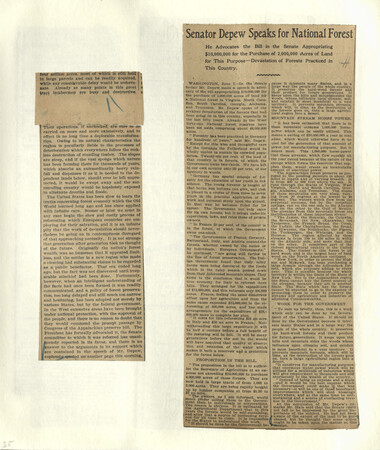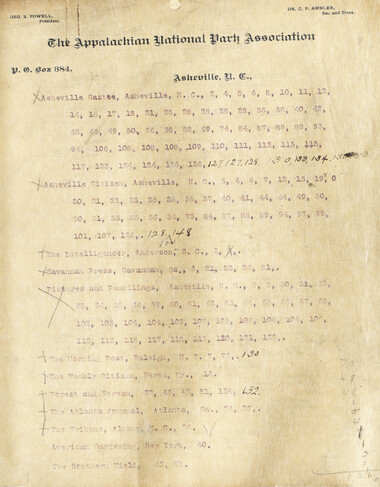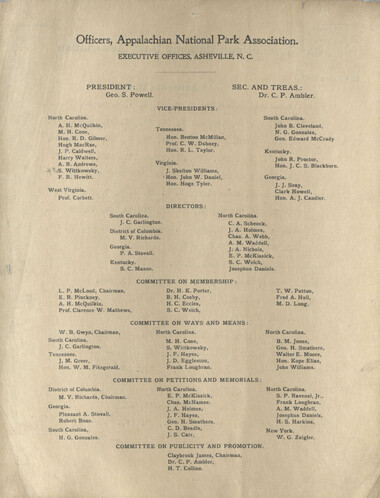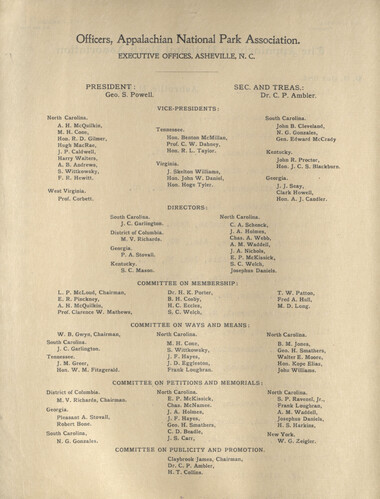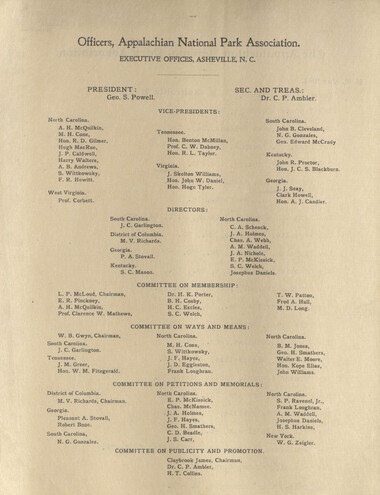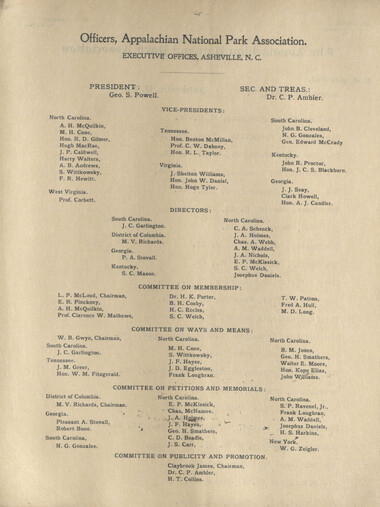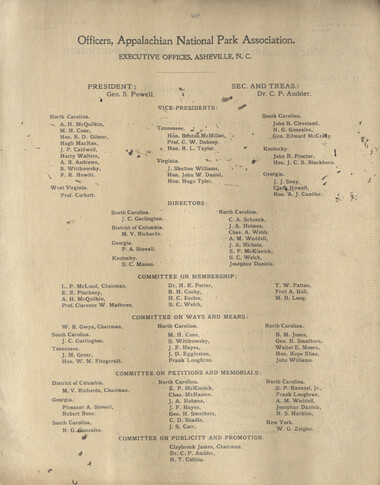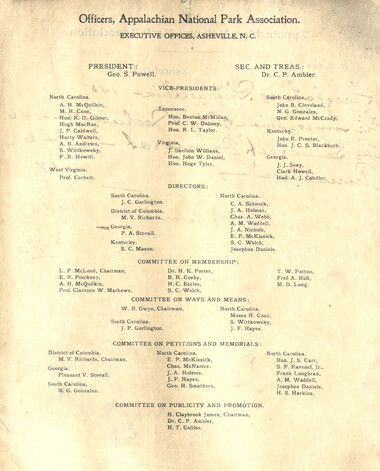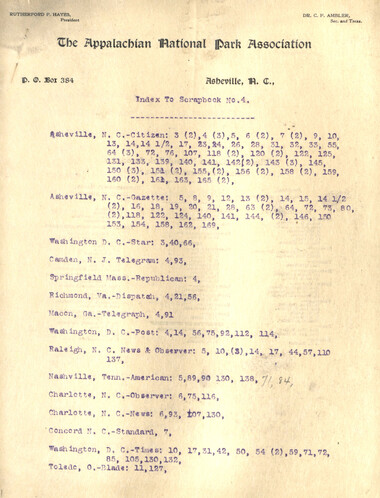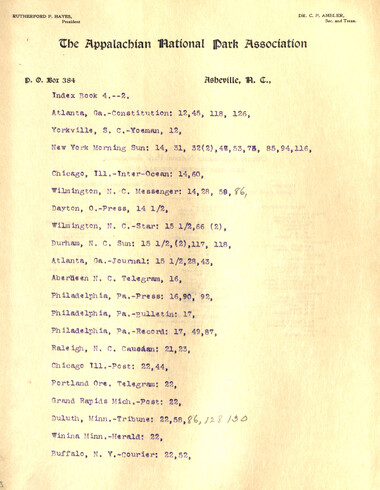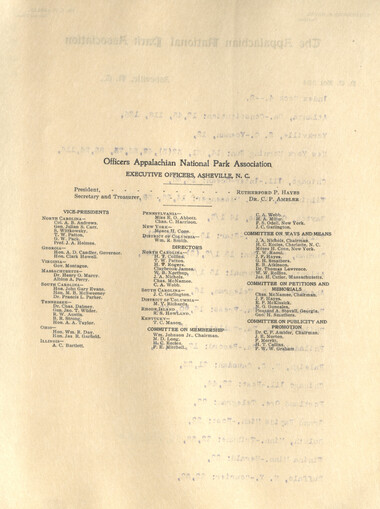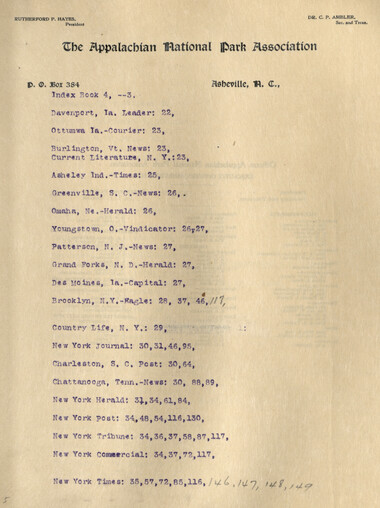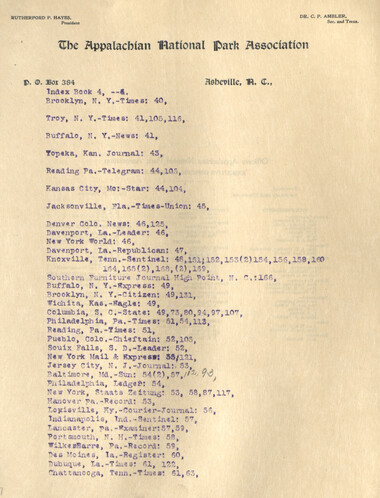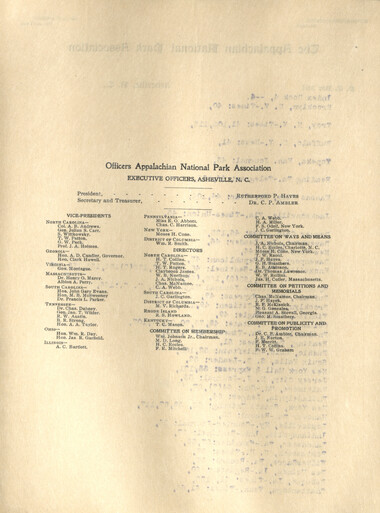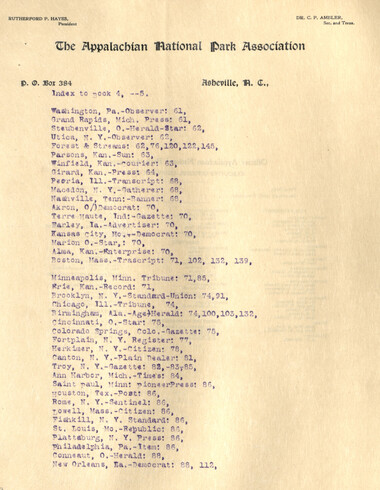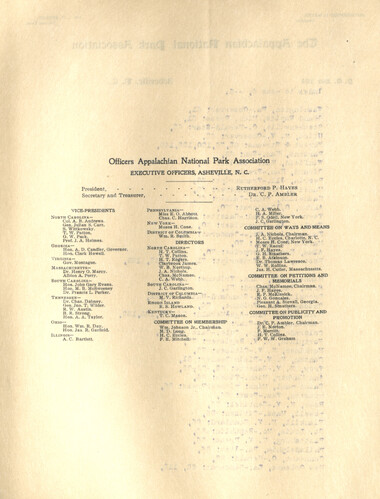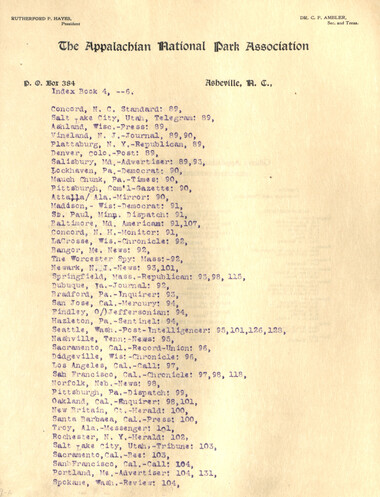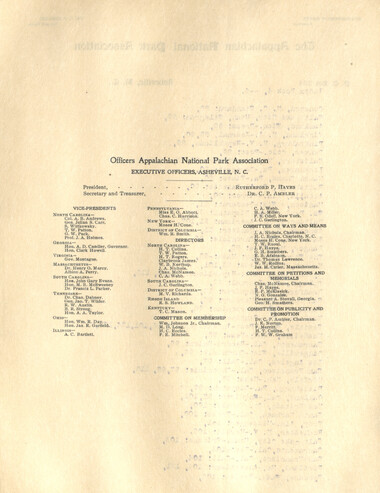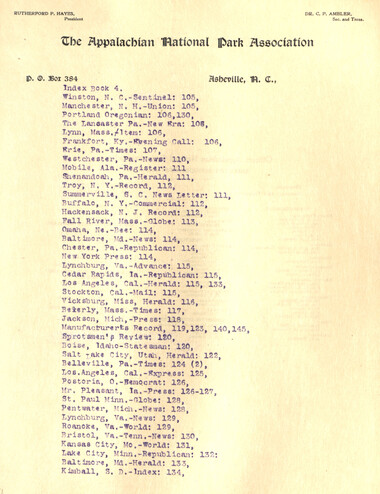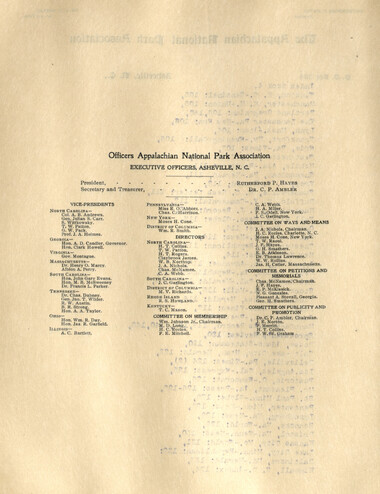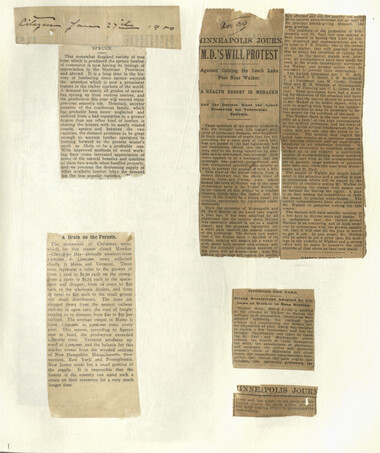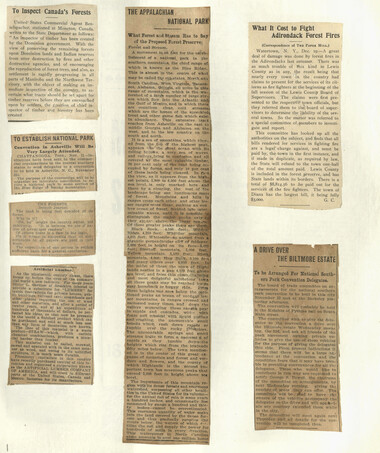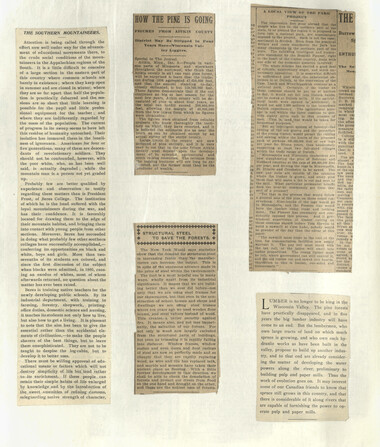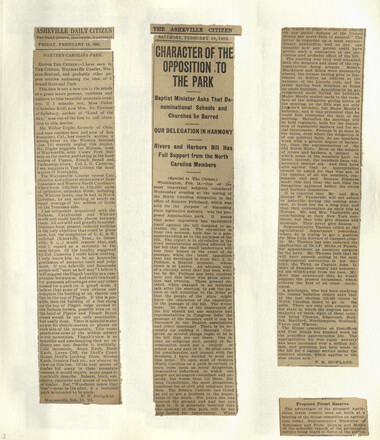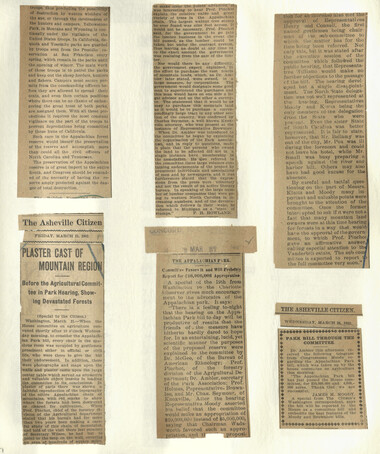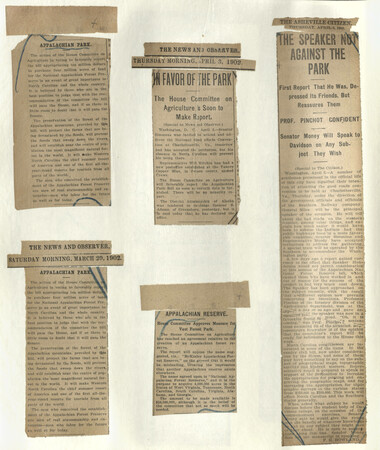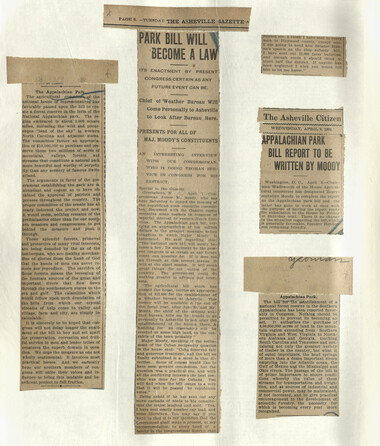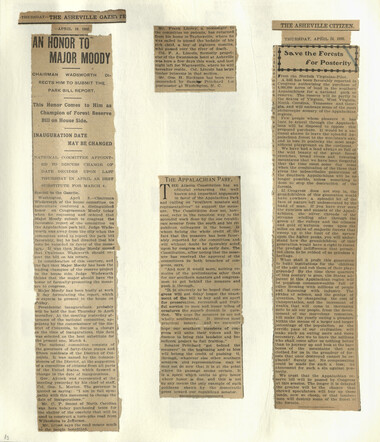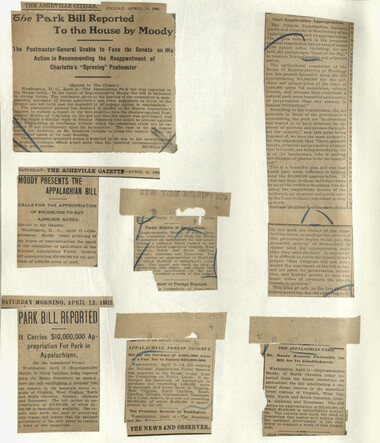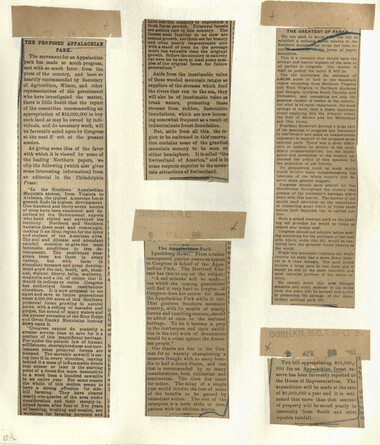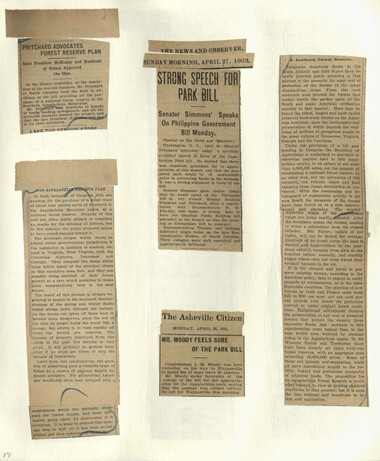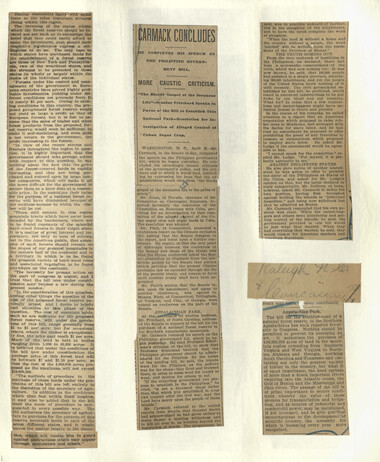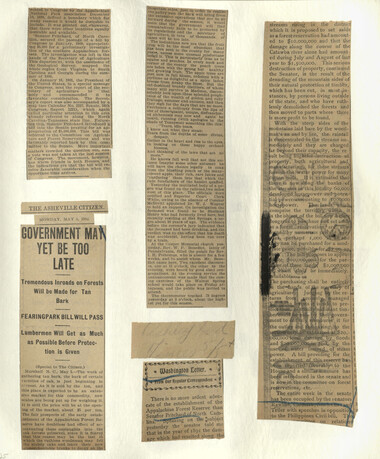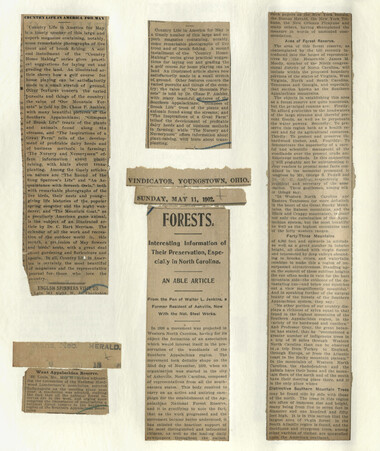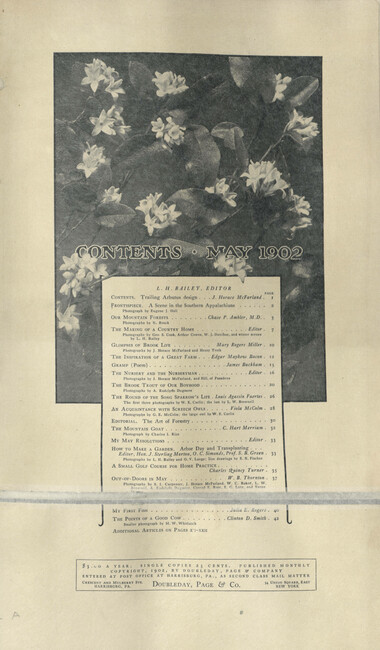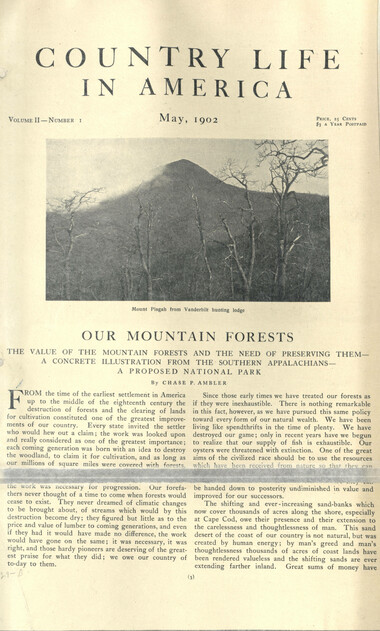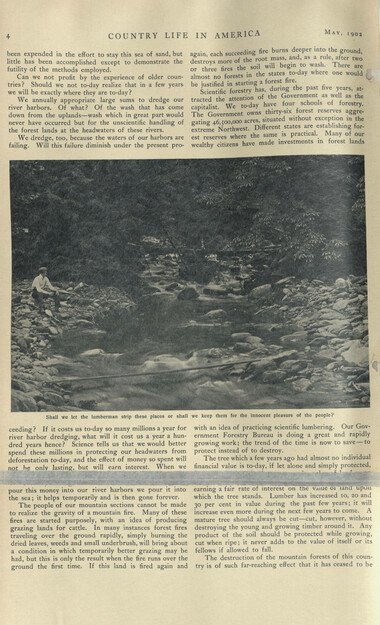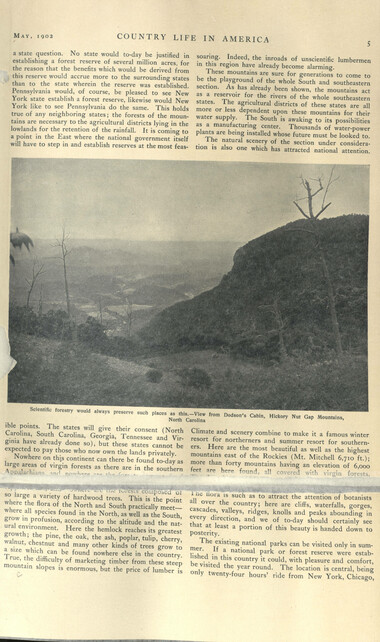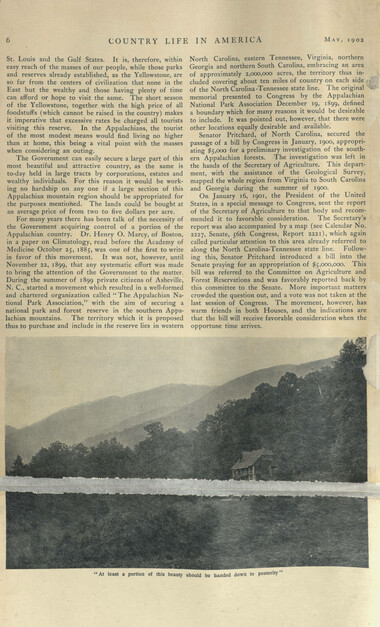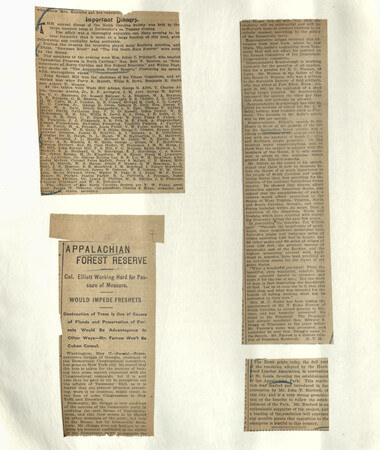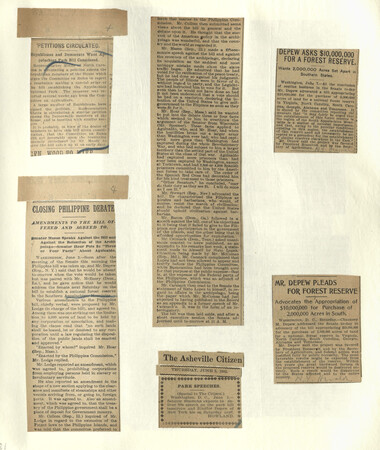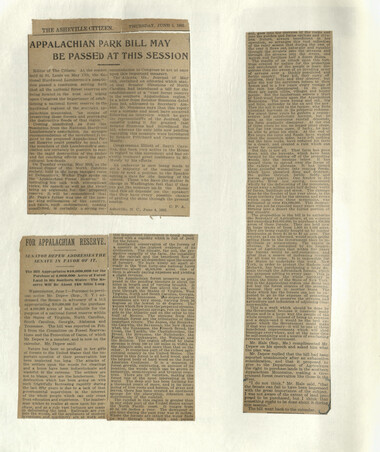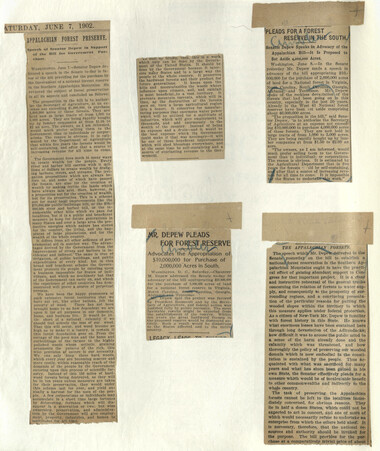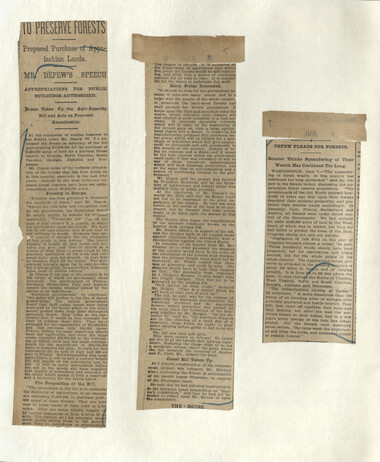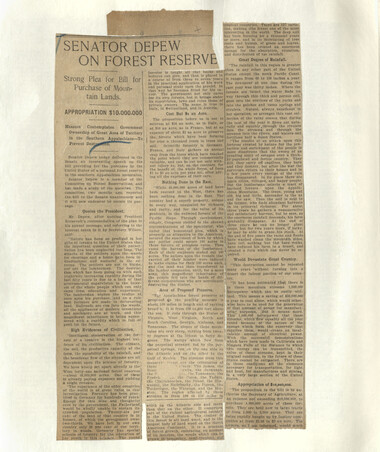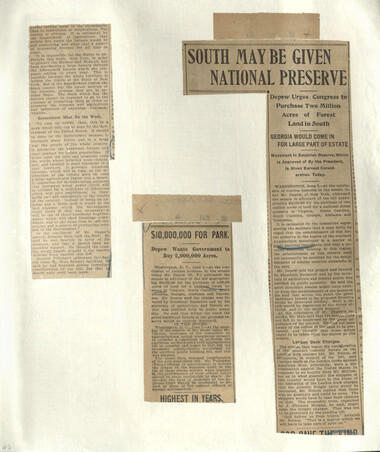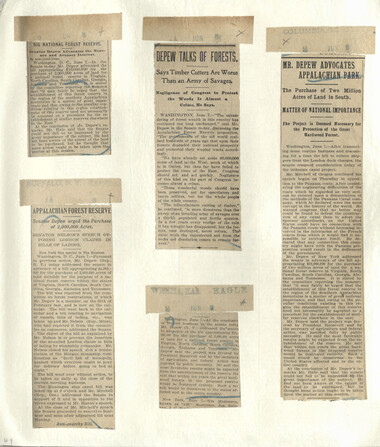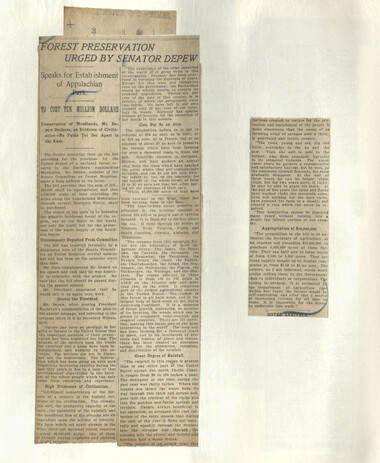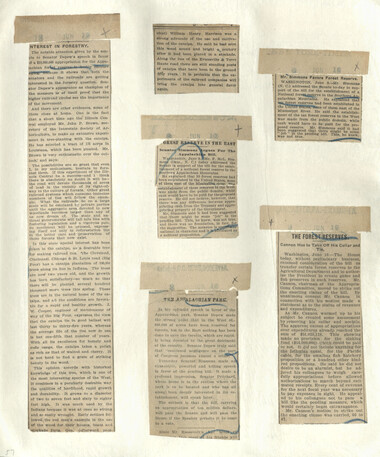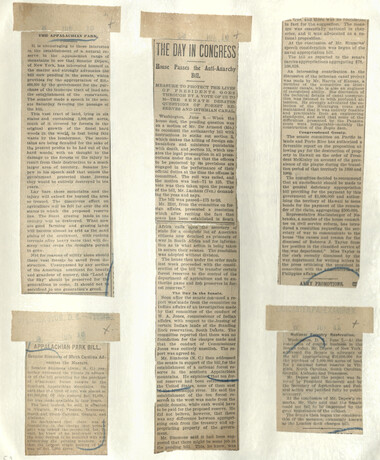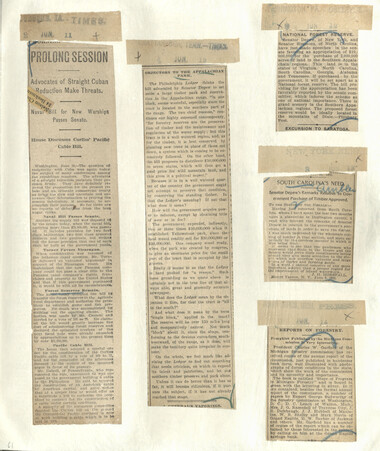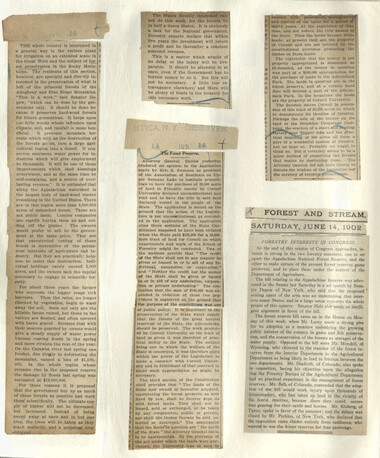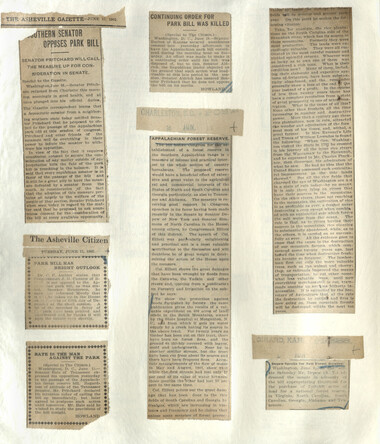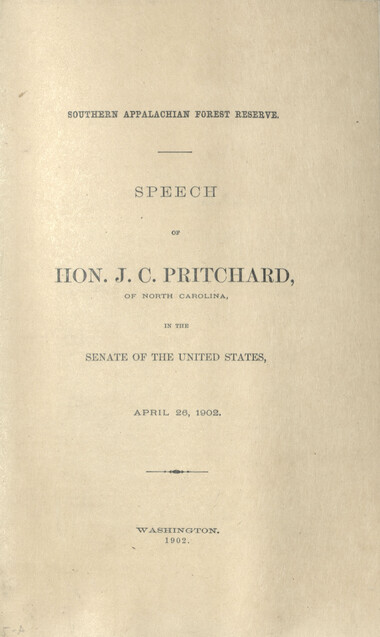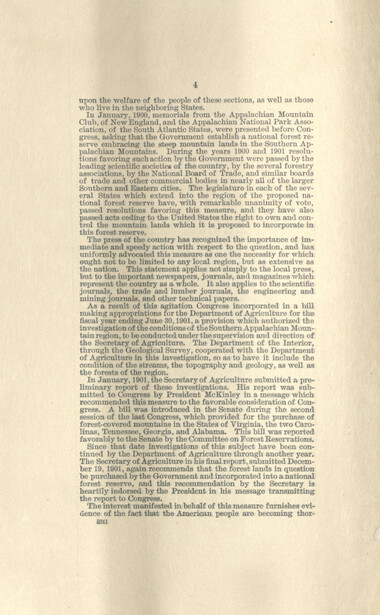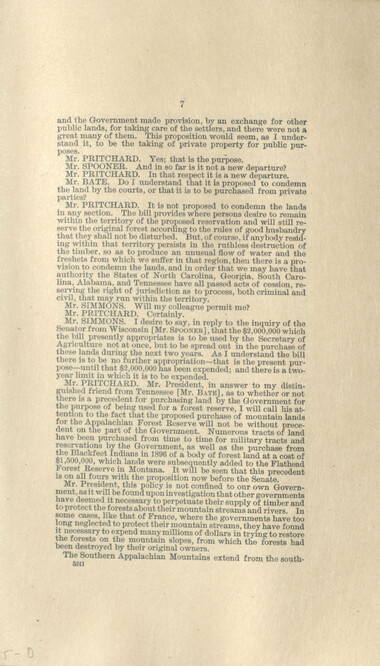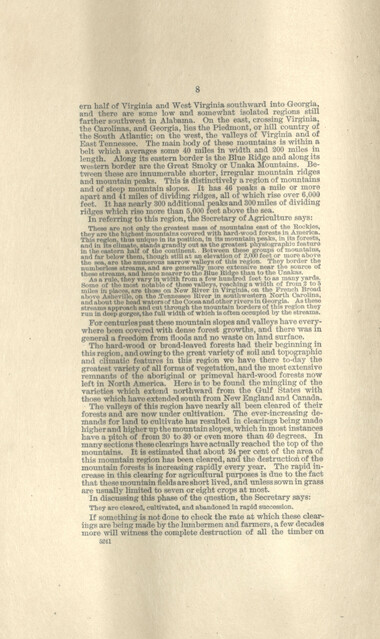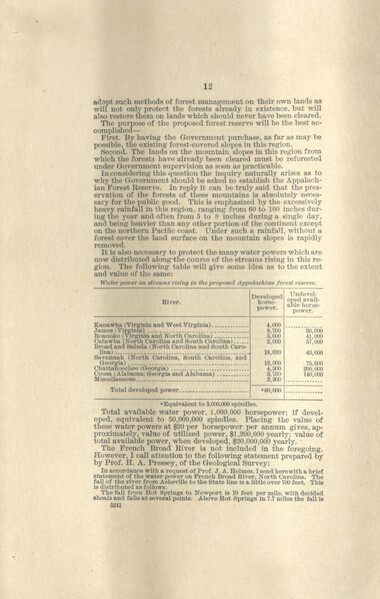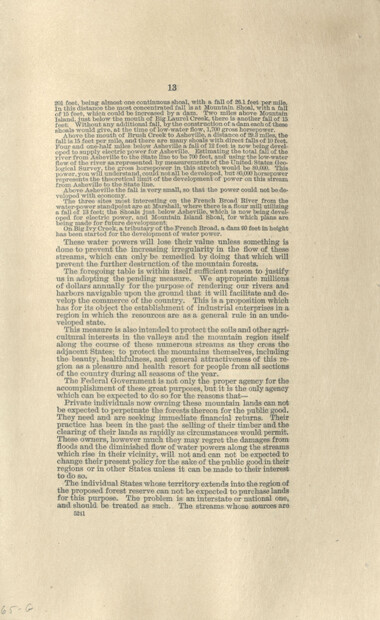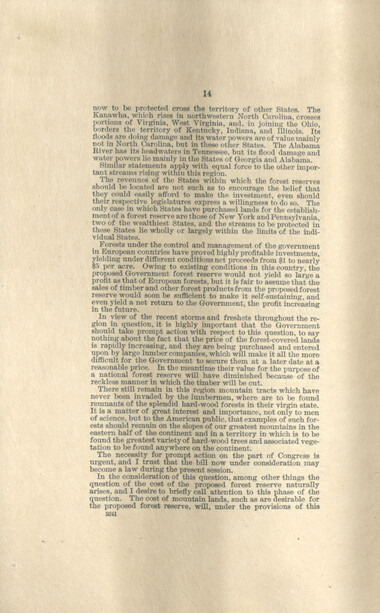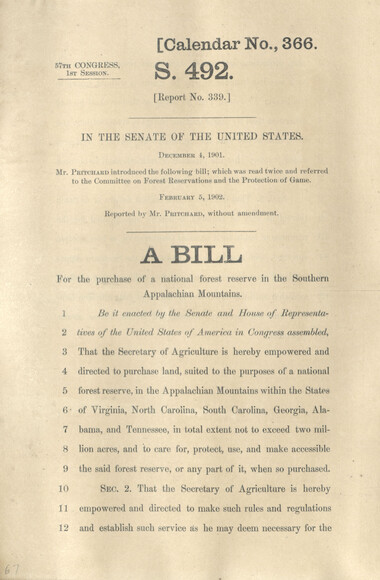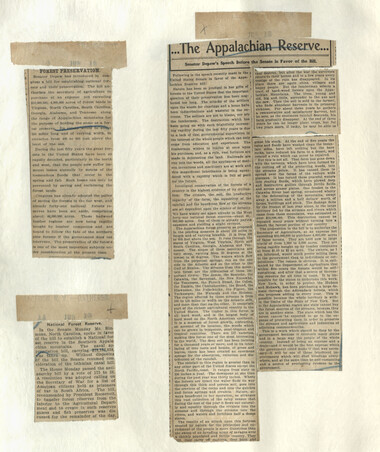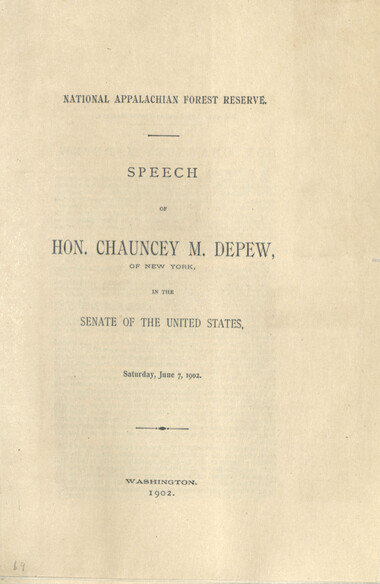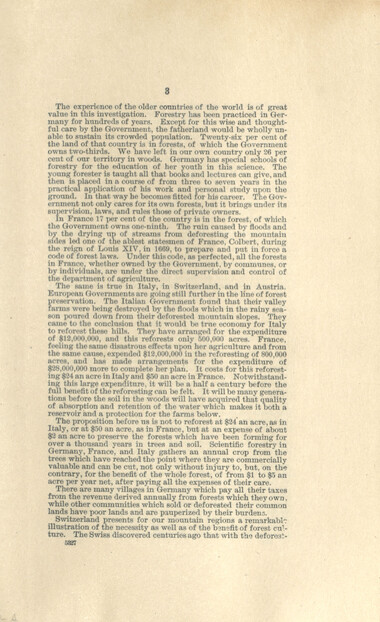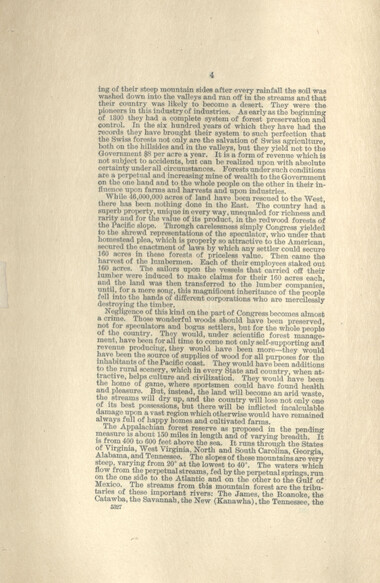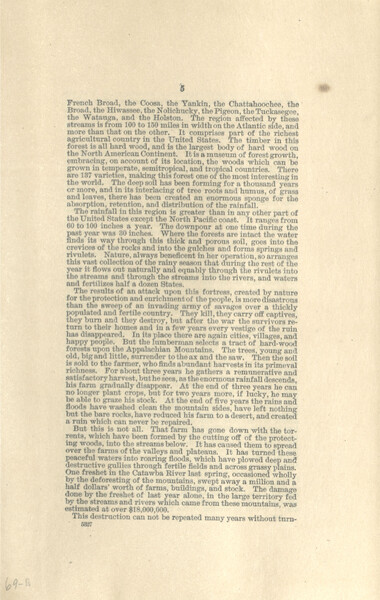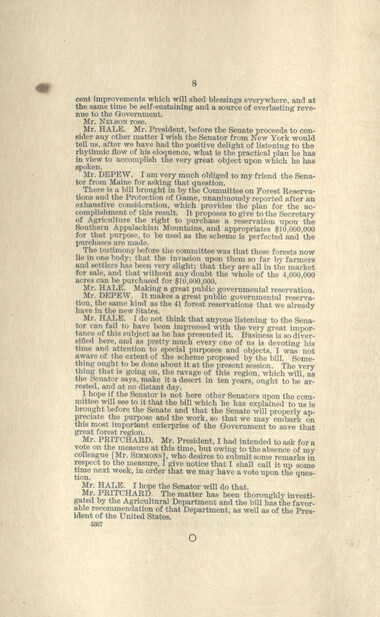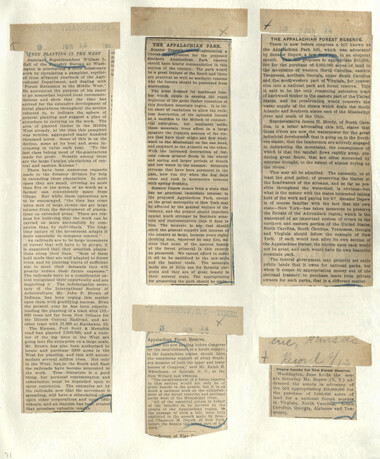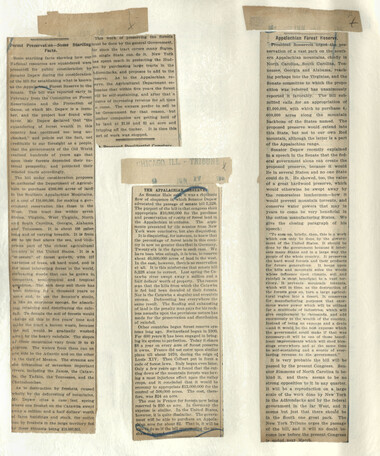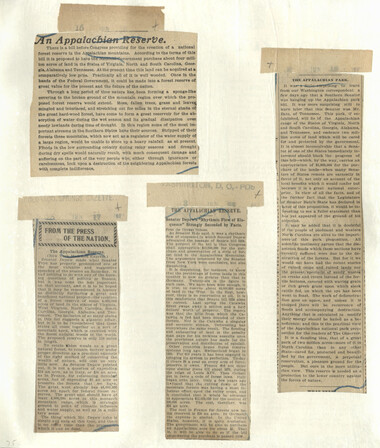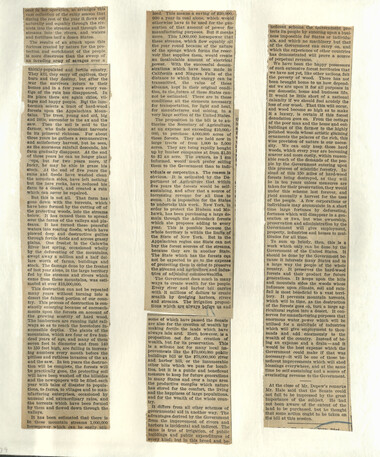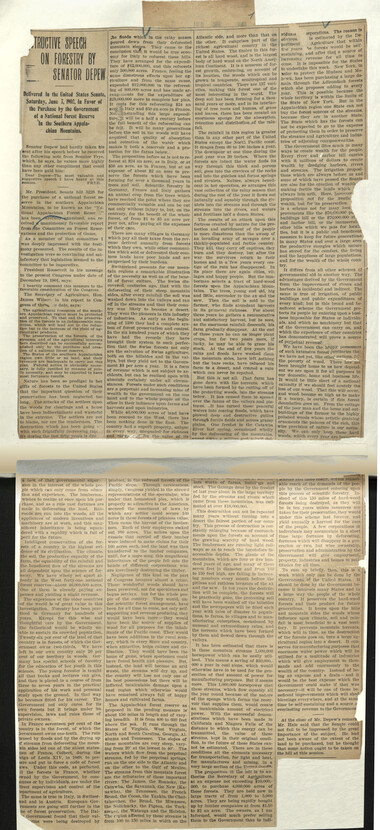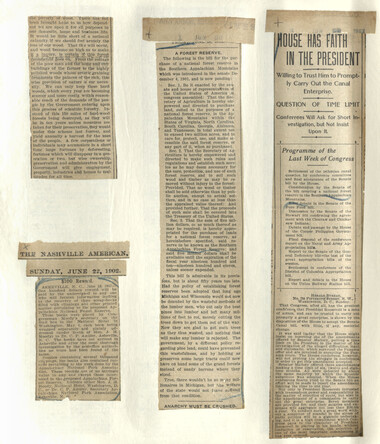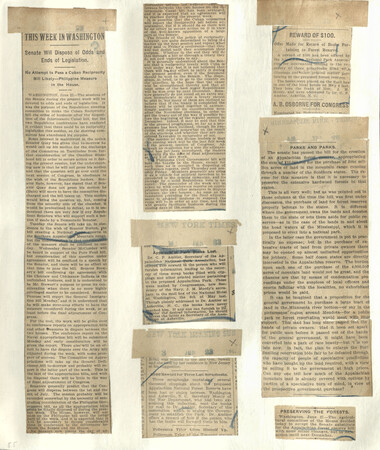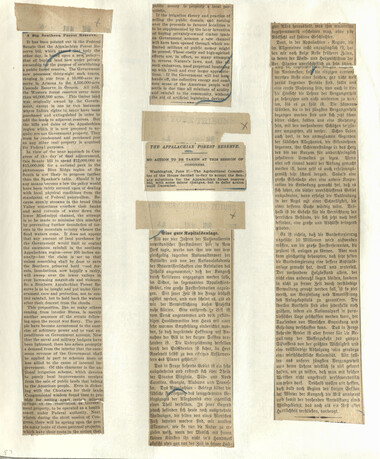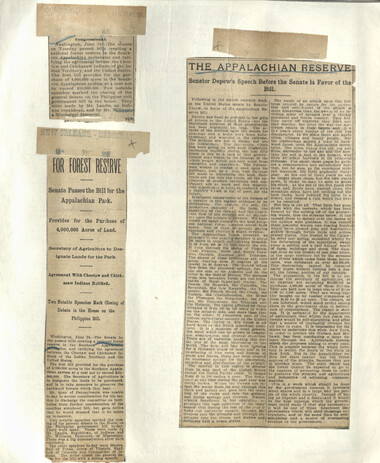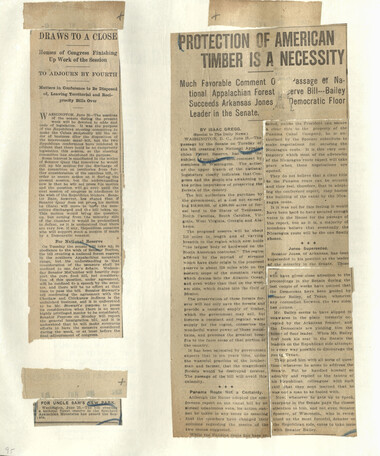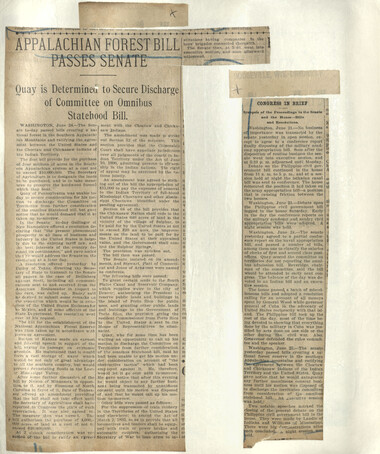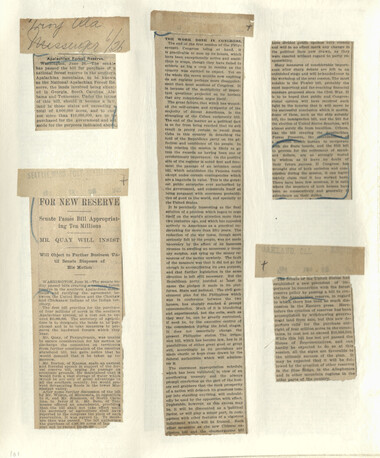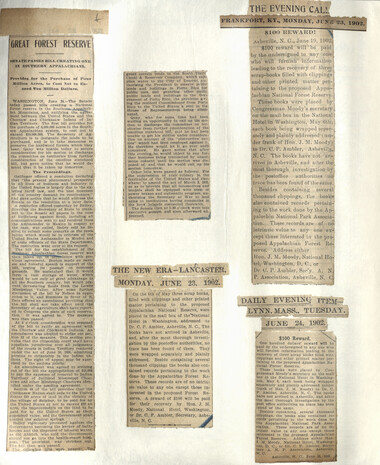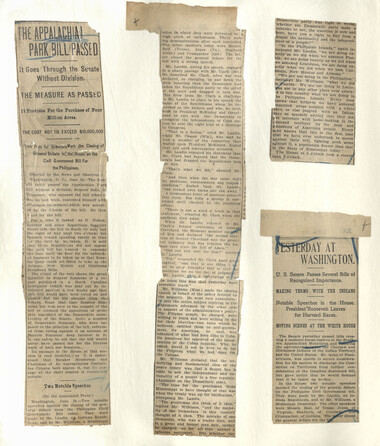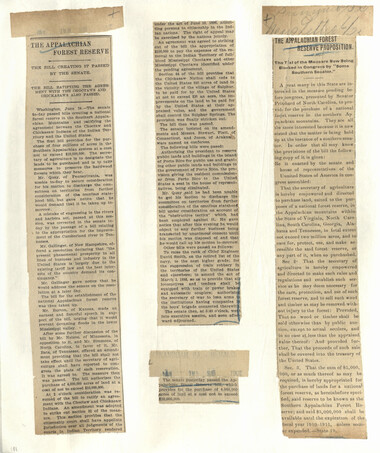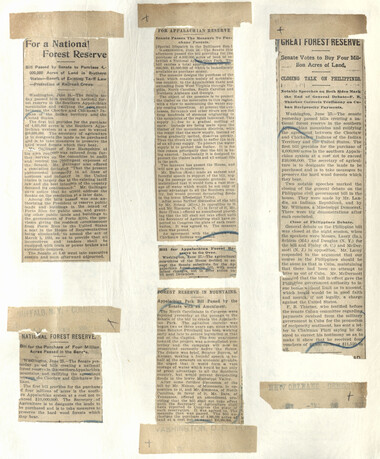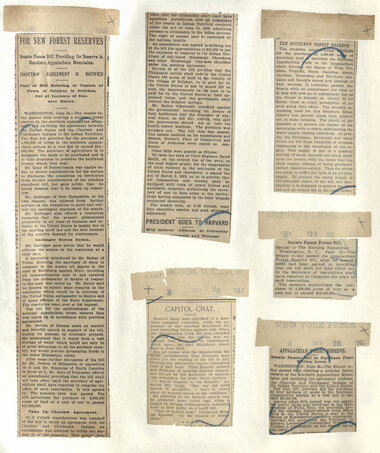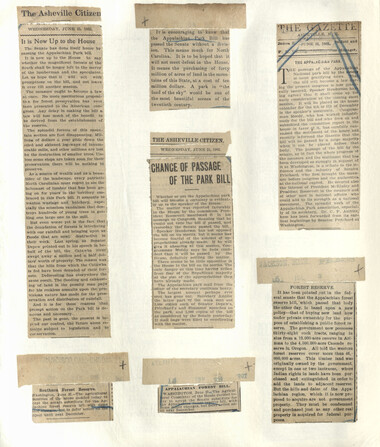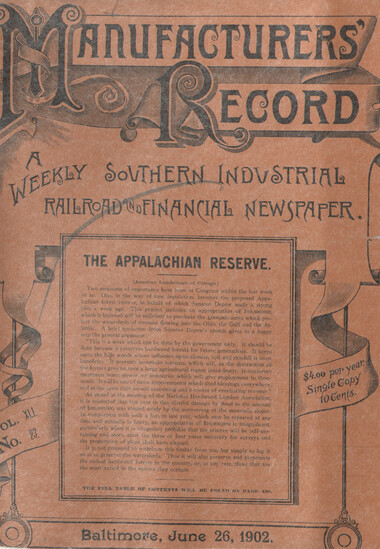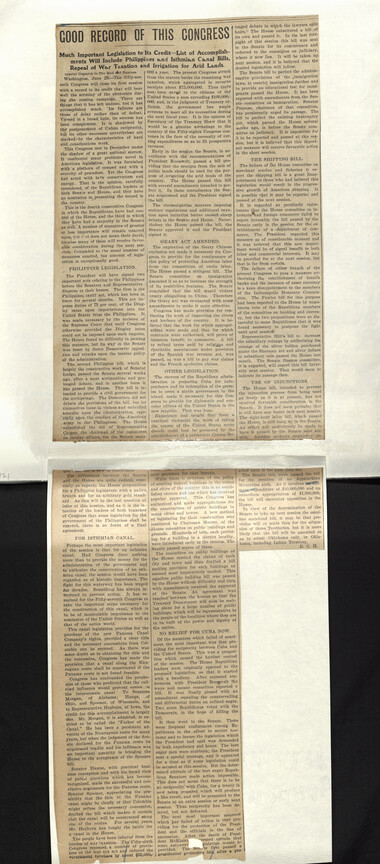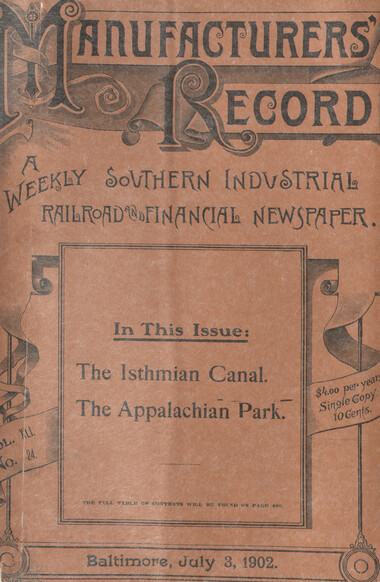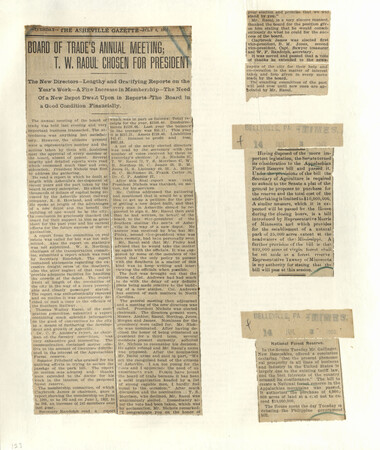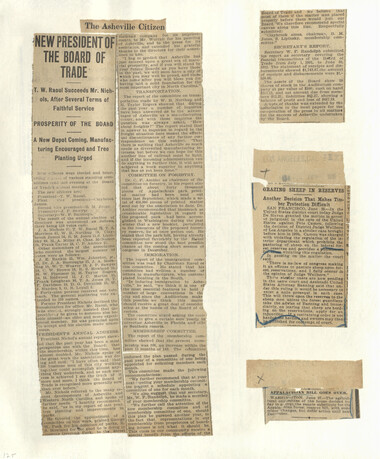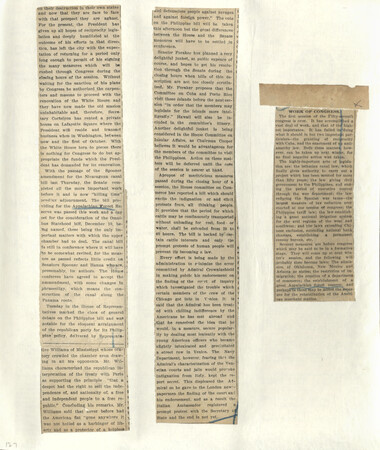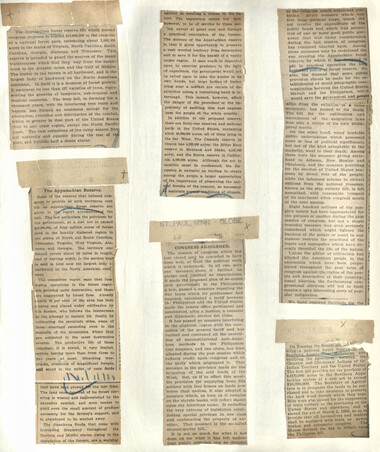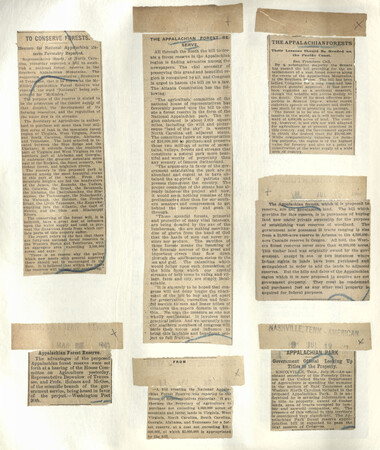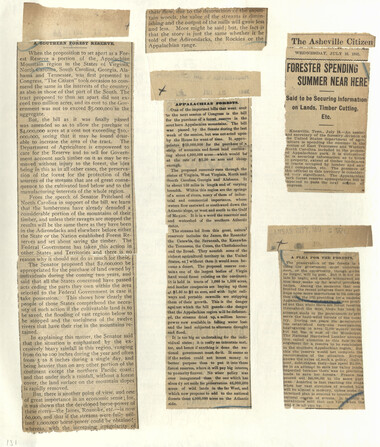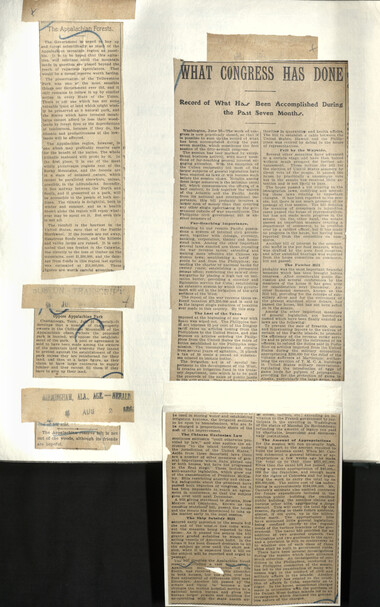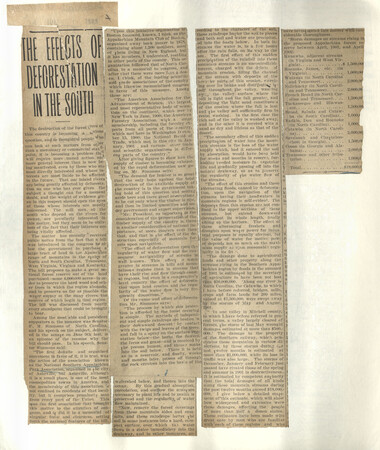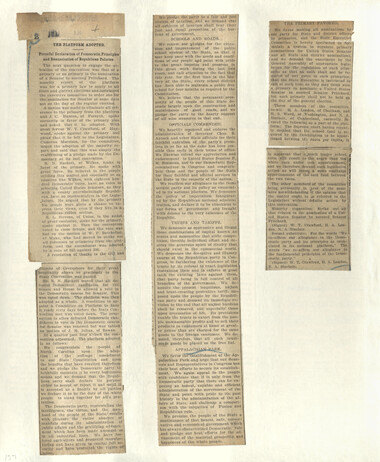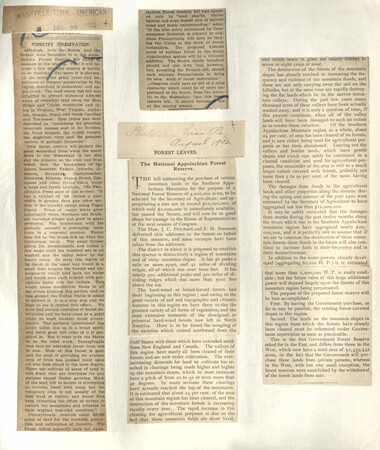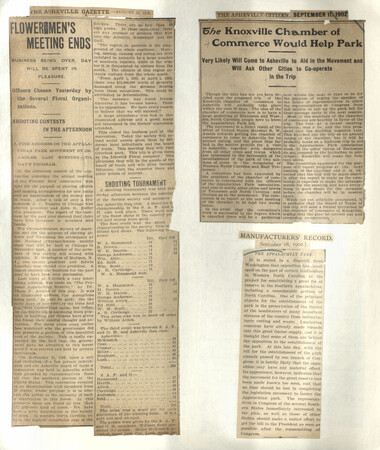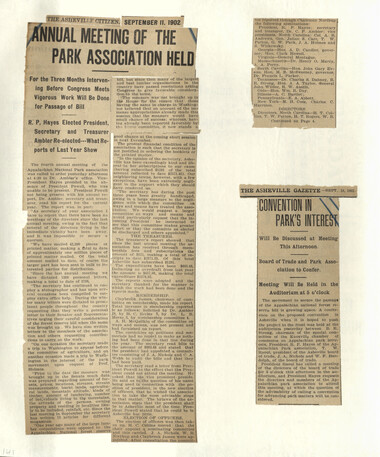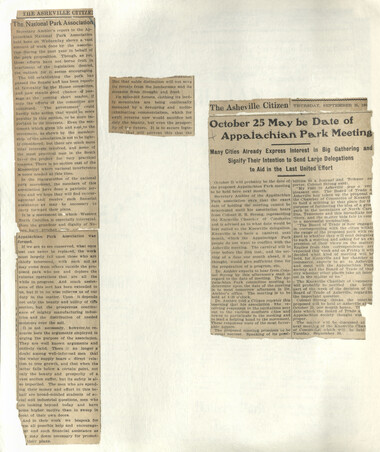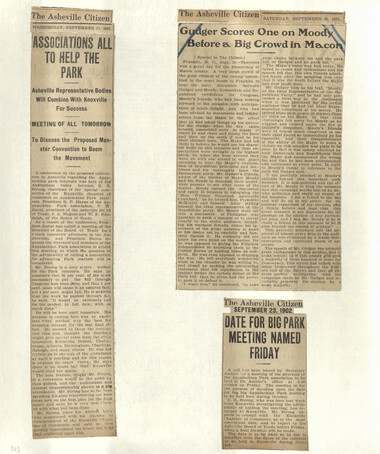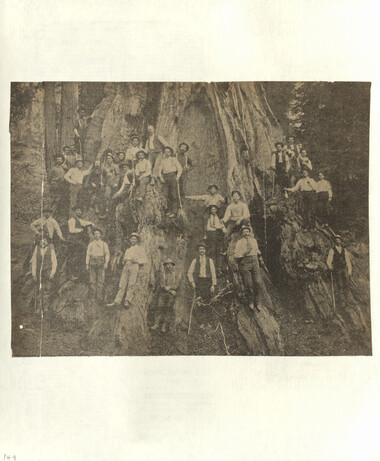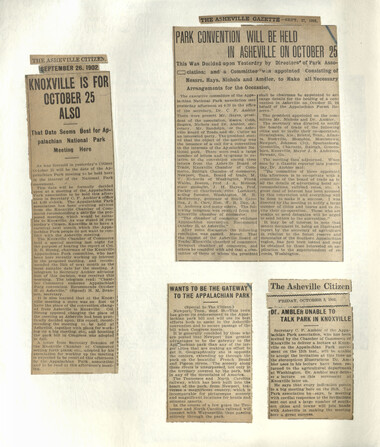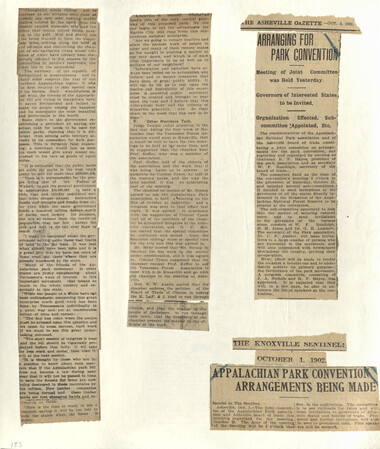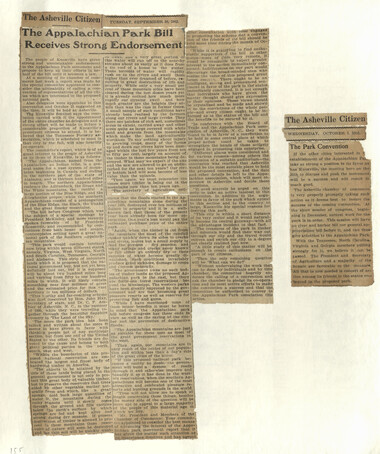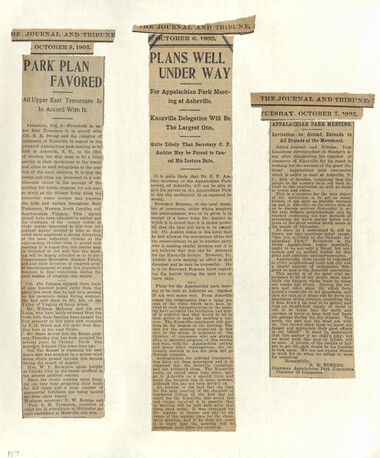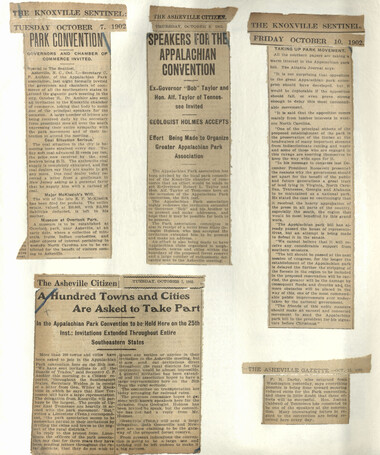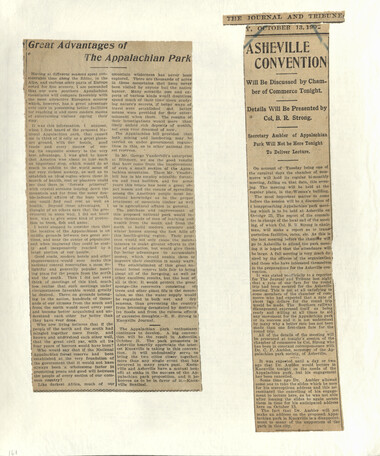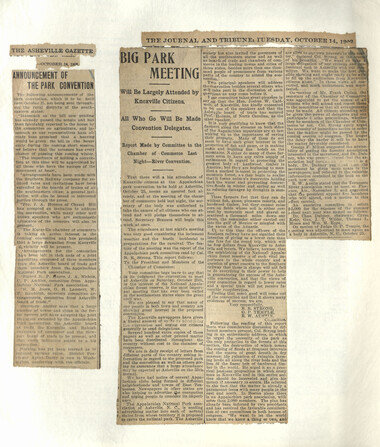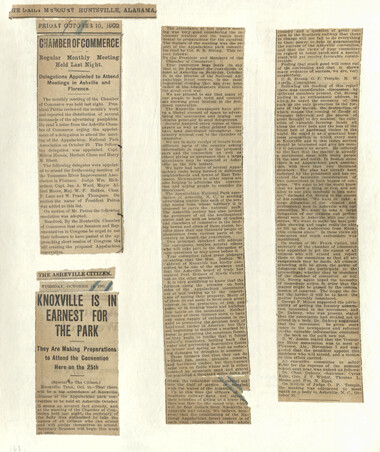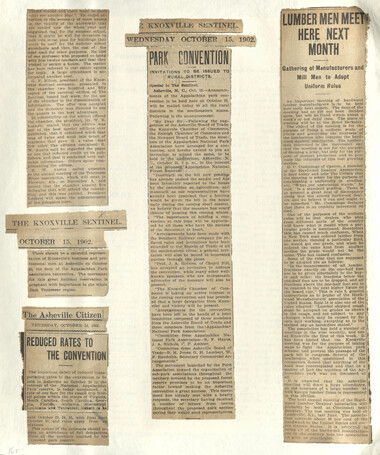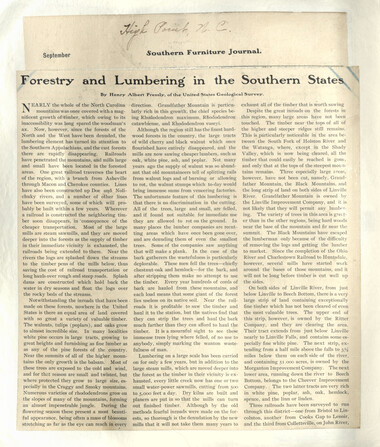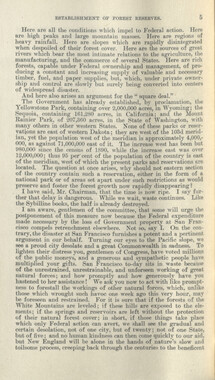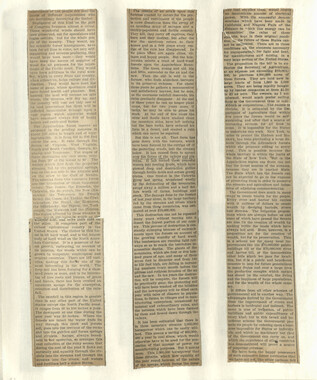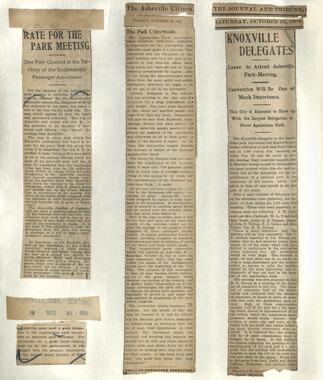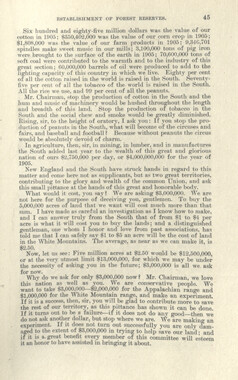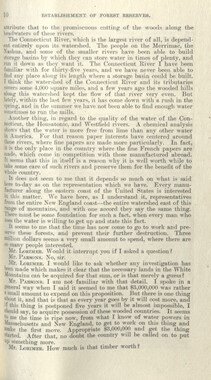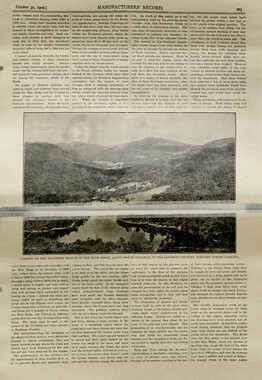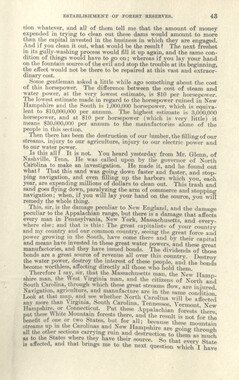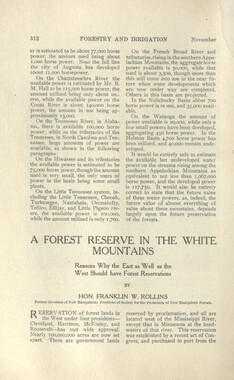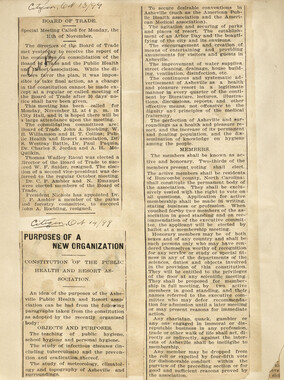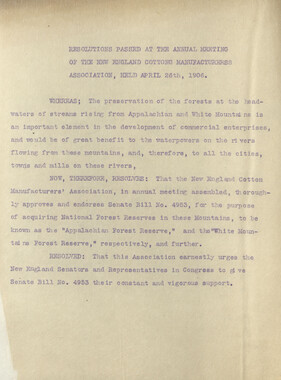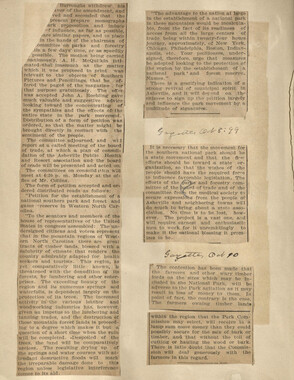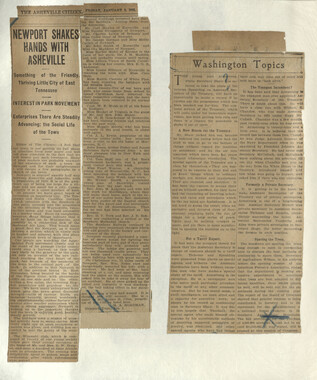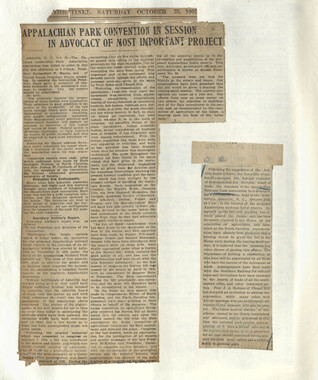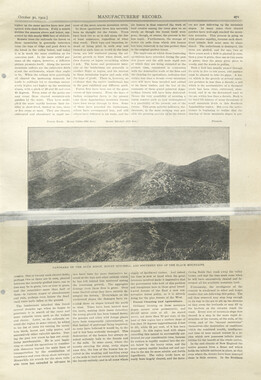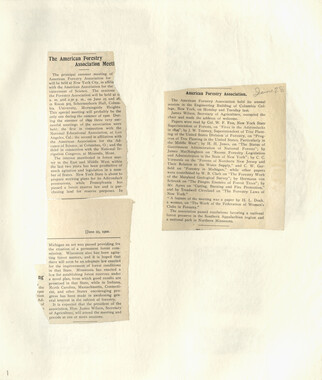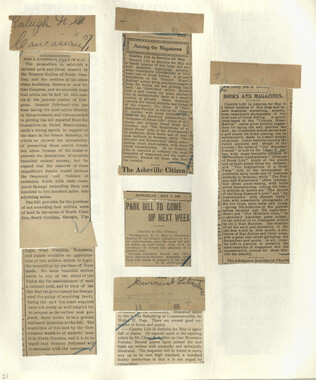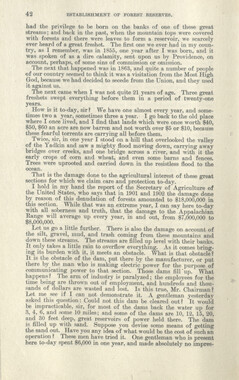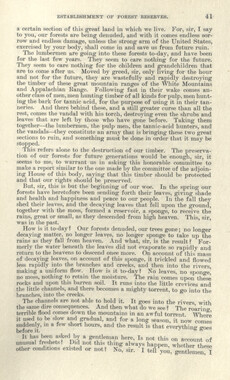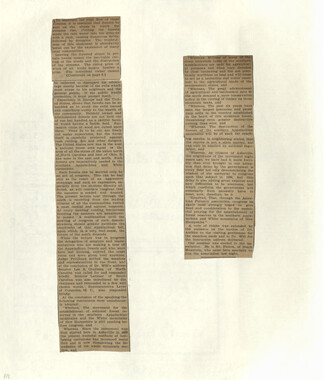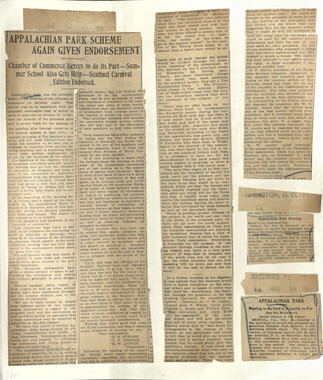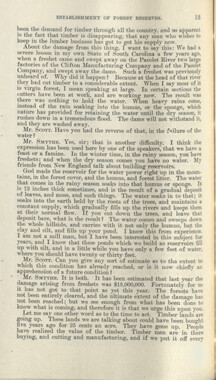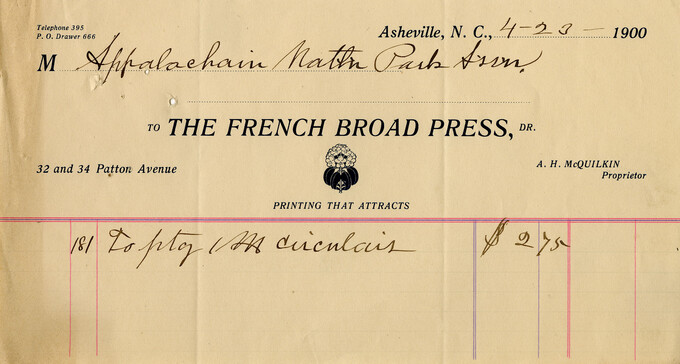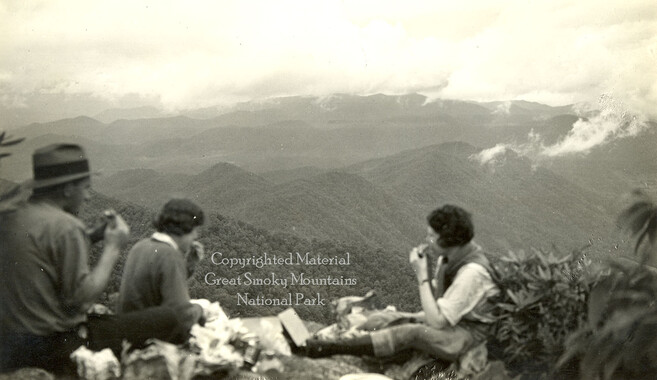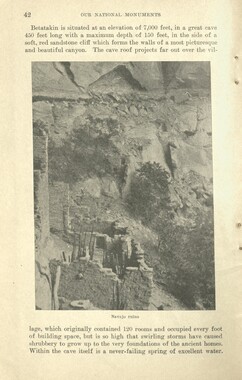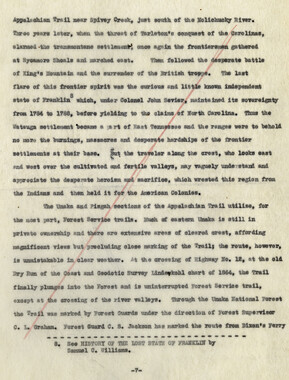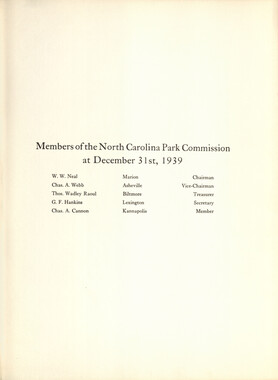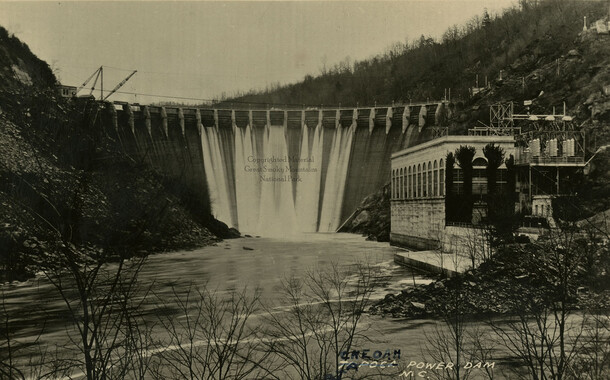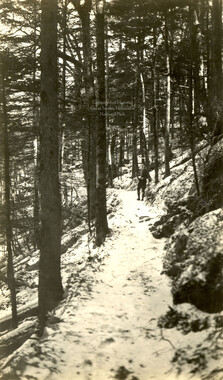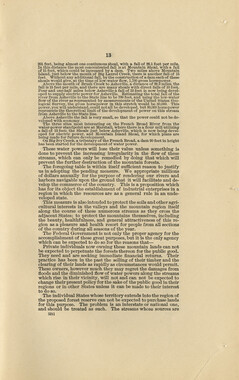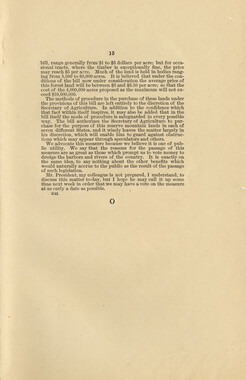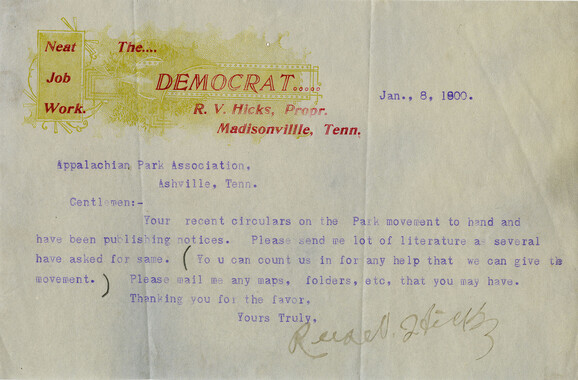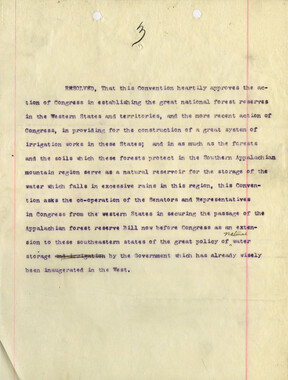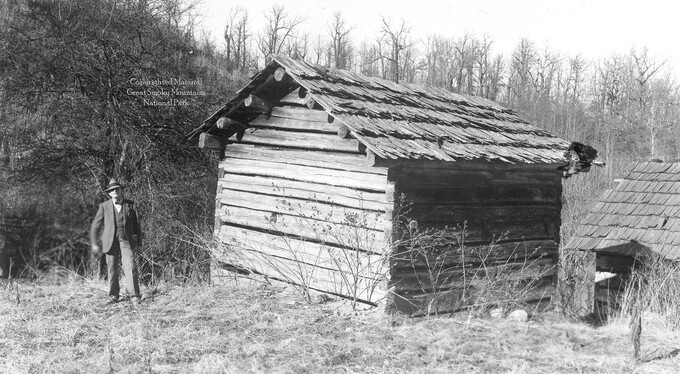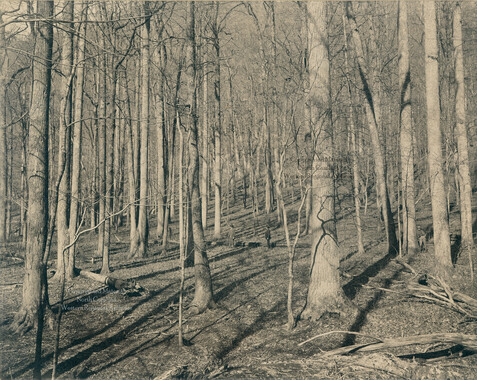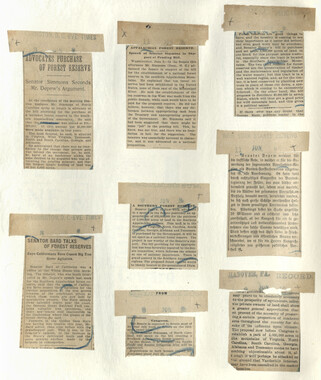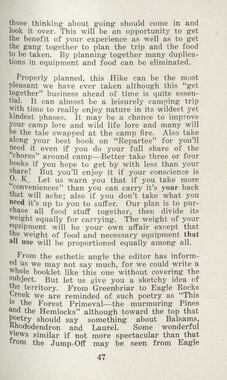Western Carolina University (20)
View all
- Canton Champion Fibre Company (2308)
- Cherokee Traditions (293)
- Civil War in Southern Appalachia (165)
- Craft Revival (1942)
- Great Smoky Mountains - A Park for America (2767)
- Highlights from Western Carolina University (430)
- Horace Kephart (941)
- Journeys Through Jackson (154)
- LGBTQIA+ Archive of Jackson County (26)
- Oral Histories of Western North Carolina (314)
- Picturing Appalachia (6772)
- Stories of Mountain Folk (413)
- Travel Western North Carolina (160)
- Western Carolina University Fine Art Museum Vitreograph Collection (129)
- Western Carolina University Herbarium (92)
- Western Carolina University: Making Memories (708)
- Western Carolina University Publications (2283)
- Western Carolina University Restricted Electronic Theses and Dissertations (146)
- Western North Carolina Regional Maps (71)
- World War II in Southern Appalachia (131)
University of North Carolina Asheville (6)
View all
- Appalachian National Park Association (53)
- Berry, Walter (76)
- Champion Fibre Company (5)
- Fromer, Irving Rhodes, 1913-1994 (70)
- Grant, George Alexander, 1891-1964 (96)
- Kephart, Horace, 1862-1931 (23)
- Masa, George, 1881-1933 (17)
- North Carolina Park Commission (105)
- Roth, Albert, 1890-1974 (142)
- Schenck, Carl Alwin, 1868-1955 (1)
- Stearns, I. K. (2)
- Thompson, James Edward, 1880-1976 (45)
- Weaver, Zebulon, 1872-1948 (55)
- Wilburn, Hiram Coleman, 1880-1967 (72)
- Allanstand Cottage Industries (0)
- Bennett, Kelly, 1890-1974 (0)
- Brasstown Carvers (0)
- Cain, Doreyl Ammons (0)
- Carver, George Washington, 1864?-1943 (0)
- Cathey, Joseph, 1803-1874 (0)
- Champion Paper and Fibre Company (0)
- Cherokee Indian Fair Association (0)
- Cherokee Language Program (0)
- Crittenden, Lorraine (0)
- Crowe, Amanda (0)
- Edmonston, Thomas Benton, 1842-1907 (0)
- Ensley, A. L. (Abraham Lincoln), 1865-1948 (0)
- George Butz (BFS 1907) (0)
- Goodrich, Frances Louisa (0)
- Heard, Marian Gladys (0)
- Kephart, Calvin, 1883-1969 (0)
- Kephart, Laura, 1862-1954 (0)
- Laney, Gideon Thomas, 1889-1976 (0)
- McElhinney, William Julian, 1896-1953 (0)
- Niggli, Josephina, 1910-1983 (0)
- Osborne, Kezia Stradley (0)
- Owens, Samuel Robert, 1918-1995 (0)
- Penland Weavers and Potters (0)
- Rhodes, Judy (0)
- Roberts, Vivienne (0)
- Sherrill's Photography Studio (0)
- Smith, Edward Clark (0)
- Southern Highland Handicraft Guild (0)
- Southern Highlanders, Inc. (0)
- Stalcup, Jesse Bryson (0)
- United States. Indian Arts and Crafts Board (0)
- USFS (0)
- Vance, Zebulon Baird, 1830-1894 (0)
- Western Carolina College (0)
- Western Carolina Teachers College (0)
- Western Carolina University (0)
- Western Carolina University. Mountain Heritage Center (0)
- Whitman, Walt, 1819-1892 (0)
- Williams, Isadora (0)
- 1810s (1)
- 1840s (1)
- 1850s (2)
- 1860s (3)
- 1870s (4)
- 1880s (7)
- 1890s (64)
- 1900s (294)
- 1910s (227)
- 1920s (461)
- 1930s (1585)
- 1940s (82)
- 1950s (15)
- 1960s (13)
- 1970s (47)
- 1980s (14)
- 1990s (17)
- 2000s (31)
- 2010s (1)
- 1600s (0)
- 1700s (0)
- 1800s (0)
- 1820s (0)
- 1830s (0)
- 2020s (0)
- Appalachian Region, Southern (80)
- Asheville (N.C.) (1)
- Avery County (N.C.) (6)
- Blount County (Tenn.) (159)
- Buncombe County (N.C.) (204)
- Cherokee County (N.C.) (10)
- Clay County (N.C.) (3)
- Graham County (N.C.) (108)
- Great Smoky Mountains National Park (N.C. and Tenn.) (438)
- Haywood County (N.C.) (263)
- Henderson County (N.C.) (13)
- Jackson County (N.C.) (58)
- Knox County (Tenn.) (21)
- Knoxville (Tenn.) (11)
- Lake Santeetlah (N.C.) (10)
- Macon County (N.C.) (25)
- Madison County (N.C.) (14)
- McDowell County (N.C.) (5)
- Mitchell County (N.C.) (7)
- Polk County (N.C.) (2)
- Qualla Boundary (22)
- Rutherford County (N.C.) (16)
- Swain County (N.C.) (516)
- Transylvania County (N.C.) (36)
- Watauga County (N.C.) (2)
- Waynesville (N.C.) (2)
- Yancey County (N.C.) (34)
- Aerial Views (3)
- Articles (1)
- Artifacts (object Genre) (4)
- Bibliographies (1)
- Clippings (information Artifacts) (77)
- Drawings (visual Works) (174)
- Envelopes (2)
- Financial Records (9)
- Fliers (printed Matter) (34)
- Guidebooks (1)
- Interviews (12)
- Land Surveys (102)
- Letters (correspondence) (219)
- Manuscripts (documents) (91)
- Maps (documents) (86)
- Memorandums (14)
- Minutes (administrative Records) (20)
- Negatives (photographs) (282)
- Newsletters (12)
- Paintings (visual Works) (1)
- Pen And Ink Drawings (1)
- Photographs (1657)
- Portraits (40)
- Postcards (15)
- Publications (documents) (107)
- Scrapbooks (3)
- Sheet Music (1)
- Songs (musical Compositions) (2)
- Sound Recordings (7)
- Speeches (documents) (11)
- Transcripts (46)
- Aerial Photographs (0)
- Albums (books) (0)
- Biography (general Genre) (0)
- Cards (information Artifacts) (0)
- Crafts (art Genres) (0)
- Depictions (visual Works) (0)
- Design Drawings (0)
- Facsimiles (reproductions) (0)
- Fiction (general Genre) (0)
- Glass Plate Negatives (0)
- Internegatives (0)
- Newspapers (0)
- Occupation Currency (0)
- Periodicals (0)
- Personal Narratives (0)
- Plans (maps) (0)
- Poetry (0)
- Programs (documents) (0)
- Questionnaires (0)
- Slides (photographs) (0)
- Specimens (0)
- Text Messages (0)
- Tintypes (photographs) (0)
- Video Recordings (physical Artifacts) (0)
- Vitreographs (0)
- Appalachian National Park Association Records (336)
- Carlos C. Campbell Collection (282)
- Cataloochee History Project (65)
- George Masa Collection (89)
- Hiram C. Wilburn Papers (28)
- Historic Photographs Collection (236)
- Horace Kephart Collection (126)
- Humbard Collection (33)
- Jim Thompson Collection (44)
- Love Family Papers (11)
- Map Collection (12)
- R.A. Romanes Collection (10)
- Smoky Mountains Hiking Club Collection (616)
- Zebulon Weaver Collection (107)
- A.L. Ensley Collection (0)
- Appalachian Industrial School Records (0)
- Axley-Meroney Collection (0)
- Bayard Wootten Photograph Collection (0)
- Bethel Rural Community Organization Collection (0)
- Blumer Collection (0)
- C.W. Slagle Collection (0)
- Canton Area Historical Museum (0)
- Cherokee Studies Collection (0)
- Daisy Dame Photograph Album (0)
- Daniel Boone VI Collection (0)
- Doris Ulmann Photograph Collection (0)
- Elizabeth H. Lasley Collection (0)
- Elizabeth Woolworth Szold Fleharty Collection (0)
- Frank Fry Collection (0)
- Gideon Laney Collection (0)
- Hazel Scarborough Collection (0)
- Hunter and Weaver Families Collection (0)
- I. D. Blumenthal Collection (0)
- Isadora Williams Collection (0)
- Jesse Bryson Stalcup Collection (0)
- John B. Battle Collection (0)
- John C. Campbell Folk School Records (0)
- John Parris Collection (0)
- Judaculla Rock project (0)
- Kelly Bennett Collection (0)
- Major Wiley Parris Civil War Letters (0)
- McFee-Misemer Civil War Letters (0)
- Mountain Heritage Center Collection (0)
- Norburn - Robertson - Thomson Families Collection (0)
- Pauline Hood Collection (0)
- Pre-Guild Collection (0)
- Qualla Arts and Crafts Mutual Collection (0)
- Rosser H. Taylor Collection (0)
- Samuel Robert Owens Collection (0)
- Sara Madison Collection (0)
- Sherrill Studio Photo Collection (0)
- Stories of Mountain Folk - Radio Programs (0)
- The Reporter, Western Carolina University (0)
- Venoy and Elizabeth Reed Collection (0)
- WCU Gender and Sexuality Oral History Project (0)
- WCU Mountain Heritage Center Oral Histories (0)
- WCU Oral History Collection - Mountain People, Mountain Lives (0)
- WCU Students Newspapers Collection (0)
- Western North Carolina Tomorrow Black Oral History Project (0)
- William Williams Stringfield Collection (0)
- Appalachian Trail (22)
- Church buildings (9)
- Civilian Conservation Corps (U.S.) (91)
- Dams (21)
- Floods (1)
- Forest conservation (11)
- Forests and forestry (42)
- Great Smoky Mountains National Park (N.C. and Tenn.) (82)
- Hunting (2)
- Logging (25)
- Maps (74)
- North Carolina -- Maps (5)
- Postcards (15)
- Railroad trains (8)
- Sports (4)
- Storytelling (2)
- Waterfalls -- Great Smoky Mountains (N.C. and Tenn.) (39)
- African Americans (0)
- Artisans (0)
- Cherokee art (0)
- Cherokee artists -- North Carolina (0)
- Cherokee language (0)
- Cherokee pottery (0)
- Cherokee women (0)
- College student newspapers and periodicals (0)
- Dance (0)
- Education (0)
- Folk music (0)
- Forced removal, 1813-1903 (0)
- Gender nonconformity (0)
- Landscape photography (0)
- Mines and mineral resources (0)
- Paper industry (0)
- Pottery (0)
- Rural electrification -- North Carolina, Western (0)
- School integration -- Southern States (0)
- Segregation -- North Carolina, Western (0)
- Slavery (0)
- Weaving -- Appalachian Region, Southern (0)
- Wood-carving -- Appalachian Region, Southern (0)
- World War, 1939-1945 (0)
- Sound (7)
- StillImage (2172)
- Text (655)
- MovingImage (0)
Appalachian National Park Association Newspaper Clippings, 1899-1902
Item
Item’s are ‘child’ level descriptions to ‘parent’ objects, (e.g. one page of a whole book).
-
-
",-" ■*"" I four million acres, most of which is still held « in large parcels and cau be readily acquired, 1 while any considerable delay would be uufortu- i Bate. Already at many points in this great s frnct lumbermen are busy and destructive, s \ Their operations, if unchecked, are sure to oe carried on more and more extensively, and to effect In no long time a deplorable transformation. Owing to its natural characteristics the region is peculiarly liable to the processes of deterioration which everywhere follow the reckless destruction of standing timber. The slopes are steep, and if the vast sponge which nature has been forming there for thousands of years, which absorbs an extraordinarily heavy rainfall and dispenses it as it Is needed to the dependent lands below, should ever be left unprotected, It would be swept away and the surrounding country would be hopelessly exposed to alternate drouths and floods. The United States has been slow to learn the truths concerning forest economy which the Old World learned lung ago and has since applied with infinite care. Sooner or later we must In any case begin the slow uiiil costly process of reforesting which Kuropenn countries are employing for their salvation, and it Is an infinite pity that the work of devastation should nevertheless be going on in contemptuous disregard of that approaching necessity. It is not strange that generation after generation took no thought of the future. Originally the nation's forest wealth was so Immense that it appeared limitless, and the settler in S new region who made a clearing had substantial claims to be regarded as u, public benefactor. That era ended long ago, bin. the fact was not discovered until irreparable mischief bad been done. Fortunately, however, when an intelligent understanding of the facts bad once been formed it was readily communicated, and a policy of forest, preservation, too long delayed and still miu-li too narrow and hesitating, bus been adopted not merely by various States, lint by the federal government. In the West extensive areas have been brought iiniier ii.-ifioiuil protection, with the approval of (he people, and there Is no reason to doubt that they would commend the prompt passage by ('(ingress of the Appalachian preserve bill. The (resident has formally advocated it, the Senate committee to which it was referred has unanimously reported in its favor, and there is no nswer to the arguments in its support which re contained in the speech of Mr. Depew, copiously, quoted on another page this morning. Senator Depew Speaks for National Forest He Advocates the Bill in the Senate Appropriating $10,000,000 for the Purchase of 2,000,000 Acres of Land for This Purpose—Devastation of Forests Practiced in This Country. AMAA/WVW WASHINGTON, June 7.—In the Senate to-day Mr. Depew made a speech in advocacy ot the bill appropriating $10,000,000 for the purchase of 2,000,000 acres of land for a National, forest In Virginia. North Carolina, South Carolina, Georgia, Alabama, and Tennessee. Mr. Depew spoke of the reckless devastation of the forests that had been goiug on in this country, especially In the last fifty years. Already in the West forty-one National lorest reserves have been set aside comprising about 46.000,000 acres. " Forestry has been practiced in Germany for hundreds of years," said Mr. Depew. " Except for this wise and thoughtful care by the Germajis the Fatherland would be wholly unable to sustain Its crowded population. Twenty-six per cent, of the land of that country Is In forests, of which the Government owns two-thirds. We have left In our own country only 20 per cent, of our territory In woods. " Germany has special schools of forestry for the education of her youth in the science. The young forester Is taught al that books and lectures can give, and th.n is placed In a course of from three to sevm years in the practical application of lis work and personal study upon the grouPd. In that way he becomes fitted for lis career. The Government not only ca,-es for its own forests, but it brings under its supervision, laws, and rules those of prltnte owners. " In France 10 per cent, of the counti* is in the forest, of which the Governtrent owns one-ninth. " The Governments of France, Germmy, Switzerland, Italy, and Austria control the forests, whether owned by the nation or by individuals. European Governmeits," he continued, "are going still further in the line of forest preservation. The Italian Government found that their (alley farms were being destroyed by the foods which in the rainy season poured lown from their deforested mountain slopes. They came to the conclusion that It would be true economy for Italy to reforest these hills. They arranged for the expenditure of .f12,000,000, and this reforests only 500,000 acres. France, feeling the same disastrous effect upon her agriculture and from the same cause expended $12,000,000 In the reforesting of 800,000 acres, and has made arrangements for the expenditure of $28,- 000,000 more to complete her plan. " It costs for this reforesting $24 an acre in Italy and $50 an acre In France. Notwithstanding this large expediture It will be half a century before a full benefit of the restoring will be felt. It will be many generations before the soil in the woods will have acquired that quality of absorption and retention of the water which makes It both a reservoir and a protection for the farms below. PROPOSITION IN THE BILL. " The proposition In the bill is to authorize the Secretary of Agriculture at an expense not exceeding $10,000,000 to purchase 4,000,000 acres of these forests. They are now held la large tracts of from 1,000 to 5,000 acres. They are being rapidly bought up by lumber companies at from $1.50 to $<: an acre. m'nn?ew°er!'„.3 x.£m '"formed, would Sen? th^K SfUJ}g,Jbem to tne Govern- ff' 'h„an \° Individuals or corporations, the r£w,i,is °,bv^ous- " Is estimated by vear^thl f1„tUra.1 DePartment that in five Ha «4™ /v?'?sts wouM be self-sustaining, nne f£ luhfil a ?ource of Increasing reverb th» sal1* tln?e t0 -?°me. It is impossible •rT. \Staie? to understand this work. It should be done by the Government be cause It Interests many States, and in a large way the people of the whole country. It preserves the hard-wood forests and their product for future generations. It keeps upon the hills and mountainsides the woods, whose influence upon climate, soil, and rainfall Is most beneficial to -a vast territory. It prevents mountain terrents, which will. In time, as the destruction of the forests goes on, turn a large agricultural region into u desert. MOUNTAIN STREAM HORSE POWER. " It has been estimated that there Is In these mountain streams 1,000,000 horsepower which can be easily utilized. This means a saving of Sliii.OOO.OOO a year In coal abne, which would otherwise have to be used for the generation of that amount of lower for manufacturing purposes. But it means more. This 1,000,000 horse-power that these streams, which flow equably all the year round because of the nature of the sponge which forms the reservoir that supplies them, would create an Incalculable amount of electrical power. " The Appalachian forest preserve as proposed in the pending measure is about 150 miles in length and of varying breadth. It is from 400 to 000 feet above the sea. It runs through the States of Virginia, Wust Virginia. North and South Carolina, Georgia, Alabama, and Tennessee. The slopes of these mountains are very steep, varying from 20 degrees at the lowest to 40 degrees. The waters which flow from the perpetual streams, fed by the perpetual springs, run on the one side to the Atlantic and on the other to the Gulf of Mexico. The streams from this mountain forest are thetrlbutarles of these important rivers: " The James, the Roanoke, the Catawba, the Savannah, the New, (Kanawha,) the Tennessee, the French Broad, the Coosa, the Yadkin, the Chattahoochee, the Broad, the Hiwassee, the Nolichucky, the Pigeon, the Tuckasegee, the Watauga, and the Holston. The region affected by these streams Is from 100 to 150 miles in width on the Atlantic side, and more than Unit on the other. It comprises part of the richest agricultural country in the United States. The timber In this forest is all hard wood, and Is the largest boay of hard wood on the North American contln " New York, In order to protect the Hudson and Mohawk, has- been purchasing a large domain through the Adirondack ests, which she proposes adding to every year. This is possible because the * territory Is within the limits of the State of New York. Hut In the Appalachian n one State cannot buy the forest sourei the streams, because they are In am State. The Stale wlileh has Ihe forests cannot be expected to go to the expen protecting them In order to preserve streams and agriculture and Industries of adjoining Commonwealths. WORK FOR THE GOVERNMENT. " To sum up briefly, then, this is a work which only can be done by the & ment ot the United States. It should be done by the Government because it Interests many States and in a large way the people of the whole country. It -preserves the hard-wood forests and their product for future generations. It keeps upon the hills and mountain sides the woods whose Influence upon cllmatej soil, and rainfall is most beneficial to n vast territory. It prevents mountain torrents, which will In time, as the destruction of the forests goes on, turn a large agricultural region into a desert. "It conserves for manufacturing purposes that enormous water power which will be utilized for a multitude of Industries which will give employment to thousands and add enormously to the wealth ot the country. " Instead of being an expense and a drain —and it would be the best expense which the Government could make it that was necessary—it will be one of those beneficent Improvements which will shed blessings everywhere, and at the same time be self- sustaining and a source of everlasting revenue to the Government." At the conclusion of Mr. Depew's remarks Mr. Hale said that the Senate could not fall to be impressed by the great importance of the subject. He had not been aware of the extent of the land to be pur-". chased, but he thought that some action ought to be taken upon the matter at this —ssion. ^F^^^ I po r a-« Lou
Object
Object’s are ‘parent’ level descriptions to ‘children’ items, (e.g. a book with pages).
-
This is one of two notebooks assembled by the Appalachian National Park Association that includes documents and news clipping about the organization. The Appalachian National Park Association was formed in 1899 for the purpose of promoting the idea of a national park in the eastern U.S. Although housed in Asheville, North Carolina, the organization was a multi-state effort, attracting representatives from seven southern states. One of the highlights of the group’s activities was a convention held in 1902 to which 1,500 people attended. The association lobbied Congress for the creation of a park, but with limited success. The association disbanded in 1905.
-
